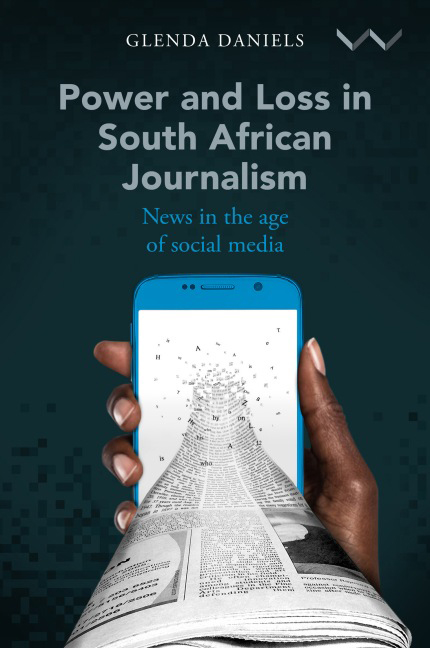Book contents
- Frontmatter
- Dedication
- Contents
- Tables and Figures
- Preface
- Acknowledgements
- Acronyms and Abbreviations
- 1 Power and Subjection in the Media Landscape
- 2 The Media, the State and Zuma’s ANC
- 3 ‘Zupta’: Power and Loss in Investigative Journalism
- 4 The Job Loss Tsunami
- 5 Going Online When You’re Offline: The Case of Community Media
- 6 The Anti-Feminist Backlash, the Glass Ceiling and Online Trolls
- 7 Decolonial ‘Green Shoots’
- 8 Power, Loss and Reimagining Journalism
- Epilogue
- Appendices
- Appendix A Press Code of Ethics and Conduct for South African Print and Online Media (effective from 1 January 2016)
- Appendix B amaBhungane Stories in the Past Two or Three Years
- Notes
- Glossary
- Bibliography
- Index
6 - The Anti-Feminist Backlash, the Glass Ceiling and Online Trolls
Published online by Cambridge University Press: 10 September 2020
- Frontmatter
- Dedication
- Contents
- Tables and Figures
- Preface
- Acknowledgements
- Acronyms and Abbreviations
- 1 Power and Subjection in the Media Landscape
- 2 The Media, the State and Zuma’s ANC
- 3 ‘Zupta’: Power and Loss in Investigative Journalism
- 4 The Job Loss Tsunami
- 5 Going Online When You’re Offline: The Case of Community Media
- 6 The Anti-Feminist Backlash, the Glass Ceiling and Online Trolls
- 7 Decolonial ‘Green Shoots’
- 8 Power, Loss and Reimagining Journalism
- Epilogue
- Appendices
- Appendix A Press Code of Ethics and Conduct for South African Print and Online Media (effective from 1 January 2016)
- Appendix B amaBhungane Stories in the Past Two or Three Years
- Notes
- Glossary
- Bibliography
- Index
Summary
The anti-feminism backlash has been set off not by women's achievement of full equality but by the increased possibility that they might win it.
Susan Faludi, BacklashWomen in the media are experiencing a harsh anti-feminist backlash via social media, (but they have also brainstormed strategies to fight back). The example of the backlash shows how women in the media in South Africa veer between power and loss.
The anti-feminist backlash in South Africa is in line with international trends, if one considers the Troll Patrol, a study released in January 2019 which monitored the abuse of women online. Amnesty International and Elemental AI analysed 300 000 tweets aimed at women politicians and journalists – labelling abuse targeting gender, race and sexuality – to find that approximately 1.1 million abusive tweets were sent to women politicians and journalists, or one every 30 seconds on average. The list comprised all female members of Parliament in the UK, female members of Congress in the US, and a selection of journalists working across a range of titles in a broad political spectrum. ‘Troll Patrol means we have the data to back up what women have long been telling us, that Twitter is a place where racism, misogyny and homophobia are allowed to flourish basically unchecked,’ remarked Milena Marin, senior advisor for tactical research at Amnesty International. The study found that black women were the most targeted, and were found to be 84 per cent more likely than white women to be mentioned in abusive or problematic tweets.
In South Africa, one of the most significant findings in the report of the largest research project to date on this topic, Glass Ceilings: Women in South African Media Houses 2018, was that trolling journalists, or online abuse using Twitter, was on the increase, and the biggest sufferers were women journalists. There were other backlashes: the number of women media leaders such as editors is declining, as documented in State of the Newsroom South Africa: Disruptions Accelerated 2014. This was once one area in which women, in particular black women, had made progress since democracy. However, in 2018–2019, as owners, board members and as editors, women were in the minority, and black women the smallest minority.
- Type
- Chapter
- Information
- Power and Loss in South African JournalismNews in the Age of Social Media, pp. 107 - 132Publisher: Wits University PressPrint publication year: 2020



